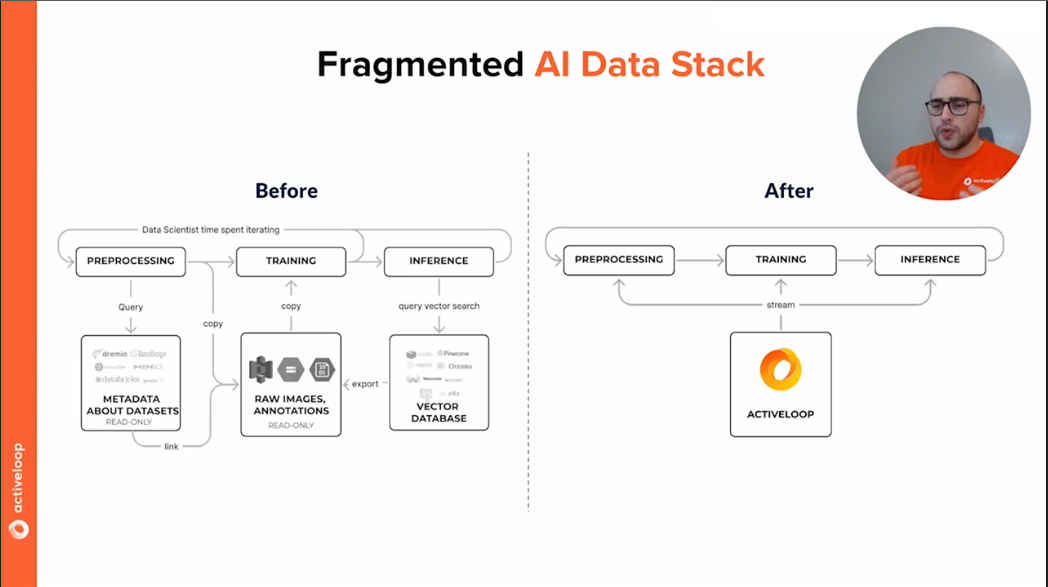| Master LLMs On Data For Free |
| Written by Nikos Vaggalis | |||
| Tuesday, 18 July 2023 | |||
|
The LangChain And Vector Databases in Production course is a joint effort by Activeloop, Towards AI and Intel Disruptor Initiative to equip professionals with the means to master Large Language Models (LLMs), going all the way from training to production. It's free and self paced. And leading to a certification as LangChain & Vector Databases in Production is part one of three which collectively comprise the Gen AI 360 Foundational Model Certification. This first installment offers a comprehensive overview of the foundational model theory, and applies it through practical projects using LangChain and Deep Lake. It revolves around:
But let's not get too far ahead of ourselves. First things first. What is LangChain and what is a vector database? LangChain is an open source framework that makes it easy to apply LLM's on your own data, so that you can interrogate it using natural language, like chatting with ChatGPT but on your own custom data, not the data that ChatGPT was trained on by default. LangChain makes that happen. The data format that LangChain works upon is called vector embeddings, a data type that carries along semantic information that the AI needs in order to understand context. It goes without saying that the best storage for these kind of data is a Vector Database such as Data Lake, which comes optimized for that purpose and allows querying that data. This nicely sums up those designated technologies at work. This course then will show you how to use LangChain together with the multi-modal Vector DB Deep Lake by building more than 10 practical projects. In total you can expect 40 hours of learning content. Note that the course is mostly text-based and has just 4 videos in total throughout the whole course.
The syllabus is as follows: 1. From Zero to Hero 2. Large Language Models and LangChain 3. Learning How to Prompt 4. Keeping Knowledge Organized with Indexes 5. Combining Components Together with Chains 6. Giving Memory to LLMs 7. Making LLMs Interact with the World Using Tools 8. Using Language Model as Reasoning Engines with Agents The entry barrier is low since you just need some familiarity with Python and coding in order to complete the projects. It also is cross disciplinary, meaning that professionals from a variety of industries can take the course and not just software developers. Required API Tokens
By running the code samples from this course you'll make requests to the OpenAI API, incurring costs. The total cost of running all the lessons in this course, along with some experimentations, is expected to be under $3. But you can also explore it locally hence without paying a penny: Go to the lesson called “Using the Open-Source GPT4All Model Locally” in the “Large Language Models and LangChain” module. This lesson teaches you how to use the open-source LLM GPT4All on your own computer, so you can enjoy benefits LLMs provide without having to pay for the OpenAI models’ API. With GPT4All, you can replace the OpenAI models in every lesson and continue your exciting journey without need to pay. As already said, there's also a Certification in using Deep Lake up for grabs by participating and completing the quizzes at the end of each chapter. To sum it up, this is not just a mere ordinary course but a gem offered to the industry for free. You don't just get up to speed to the very important concepts of LLM's, but you also get to know how to actually build real world useful applications, giving shape to a well rounded Gen AI developer, even if you don't look to use Deep Lake. Two more parts to follow.
More InformationLangChain & Vector Databases in Production Related ArticlesFollow Google's Generative AI Learning Path
To be informed about new articles on I Programmer, sign up for our weekly newsletter, subscribe to the RSS feed and follow us on Twitter, Facebook or Linkedin.
Comments
or email your comment to: comments@i-programmer.info |
|||
| Last Updated ( Tuesday, 18 July 2023 ) |




